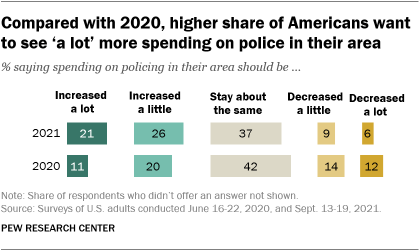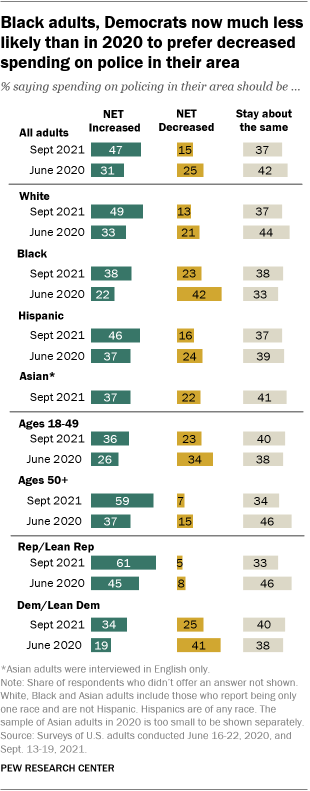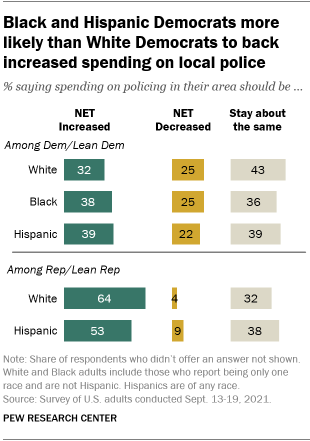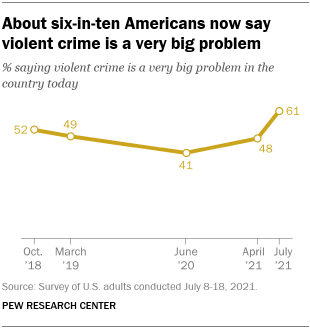
Amid mounting public concern about violent crime in the United States, Americans’ attitudes about police funding in their own community have shifted significantly.
The share of adults who say spending on policing in their area should be increased now stands at 47%, up from 31% in June 2020. That includes 21% who say funding for their local police should be increased a lot, up from 11% who said this last summer.
Support for reducing spending on police has fallen significantly: 15% of adults now say spending should be decreased, down from 25% in 2020. And only 6% now advocate decreasing spending a lot, down from 12% who said this last year. At the same time, 37% of adults now say spending on police should stay about the same, down from 42% in 2020.
Pew Research Center conducted this study to understand public views on the level of police funding in local communities and the level of concern about violent crime in the United States. This analysis is based on two separate surveys. We surveyed 10,371 U.S. adults in September 2021 and 10,221 in July 2021. Everyone who took part in both surveys is a member of the Center’s American Trends Panel (ATP), an online survey panel that is recruited though national, random sampling of residential addresses. This way nearly all U.S. adults have a chance of selection. The surveys are weighted to be representative of the U.S. adult population by gender, race, ethnicity, partisan affiliation, education and other categories. Read more about the ATP’s methodology.
Here are the questions used for the September survey and its methodology. Here are the questions used for the July survey and its methodology.
Views on police funding continue to differ widely by race and ethnicity, age and political party. White (49%) and Hispanic (46%) adults are more likely than Black (38%) or Asian (37%) adults to say spending on police in their area should be increased. Black adults (23%) are more likely to say that police funding should be decreased than those who are White (13%) or Hispanic (16%). Some 22% of Asian adults say spending should be reduced, which is statistically higher than the share among White adults but not higher than the share among Hispanic adults.
Majorities among those ages 50 and older favor increased spending on police, including 63% of those 65 and older. Young adults remain the biggest proponents of decreased police funding: Roughly a third (32%) of those ages 18 to 29 say there should be less spending on police in their area. This compares with 18% of those ages 30 to 49 and fewer than one-in-ten of those 50 and older.
Partisanship is strongly linked with views of police funding. A majority of Republicans and independents who lean to the Republican Party (61%) say spending on police should be increased, with 29% saying it should be increased a lot; 5% of Republicans say spending should be decreased, and 33% say it should stay about the same.
By contrast, 34% of Democrats and Democratic leaners say police funding should be increased, 25% say it should be decreased and 40% would like to see it stay about the same.
Since 2020, the views of Black Americans and Democrats have changed more than the views of White and Hispanic adults and Republicans when it comes to decreasing funding for local police. The share of Black adults who say police spending in their area should be decreased has fallen 19 percentage points since last year (from 42% to 23%), including a 13-point decline in the share who say funding should be decreased a lot (from 22% to 9%). The share of White and Hispanic adults who say funding for local police should be decreased also declined over this period, but not as much.
Similarly, the share of Democrats who say funding for local police should be decreased has fallen markedly – from 41% in 2020 to 25% today. By comparison, the share of Republicans who prefer less spending – which was already quite low – has moved incrementally lower. Growing shares of Republicans and Democrats alike now say police funding should be increased in their area.
Among Democrats, Black (38%) and Hispanic (39%) adults are more likely than White adults (32%) to say spending on police in their area should be increased. There is no significant difference across these racial and ethnic groups in the share of adults who say spending should be decreased.
Within the GOP, White and Hispanic adults differ in their views on this question: 64% of White Republicans say police spending in their area should be increased, compared with 53% of Hispanic Republicans. Relatively small shares in each group – 4% of White Republicans and 9% of Hispanic Republicans – would like to see spending go down. (There were too few Black Republicans in the sample to break out separately.)
The age gap in views about police funding has widened since 2020, mainly because views have shifted more dramatically among those ages 50 and older. The share of adults in this age group who say police spending should be increased has jumped 22 percentage points since 2020 (from 37% to 59%), while the increase has been more modest among those younger than 50 (from 26% to 36%). Both age groups have seen a drop-off in support for reduced spending on local police. These age patterns are similar among White and Black adults, as well as across parties.
Americans’ changing attitudes about police spending in their area have occurred amid rising public concern about violent crime. In July 2021, 61% of adults said violent crime was a very big problem in the country today, up from 48% in April 2021 and 41% in June 2020 (though concern over crime has fluctuated in recent years). In the July survey, Americans expressed more concern about violent crime than they did about the federal budget deficit (50% said this was a very big problem), climate change (47%), racism (45%), economic inequality (44%) and illegal immigration (43%).
Note: Here are the questions used for the September survey and its methodology. Here are the questions used for the July survey and its methodology.





